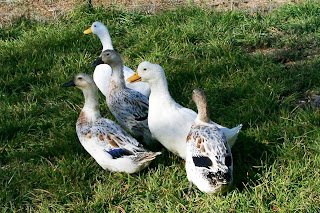 |
| Fall 2013 |
We still have 5 ducks. Three are the original Welsh Harlequins we got the spring of 2011. The other two are the pekins we got the summer of 2012 (they are the same age as our WH’s).
In July I began freezing some of the eggs, thinking that during their molt and lack of egg production, I would need eggs. I scrambled and froze them in special ice cube trays that make each cube 1/4 cup. That make a handy measure of about one egg per cube. I also froze a few in larger blocks, 1 to 1 1/2 cups each. After making the cubes or blocks, I vacuum sealed them. I found that if frozen plain, they thaw out quite “glumpy”. By adding a bit of salt to them, they are less glumpy. I also read that adding sugar would help, but I didn’t try that. Many internet sources suggested to add 1/2 tsp salt per cup of eggs, but I’m uncomfortable adding that much salt. I added about 1/8 tsp per cup. They’re still a bit glumpy, but they still scramble up fine, or go into quiches or baked goods. I also froze a few egg whites, and they don’t require the extra salt. I’ve been glad to have these frozen eggs!
Most of the ducks began molting and stopped producing eggs around the first of August. One duck, I think it’s one of the pekins, never stopped laying throughout the molt. I still consistently get one egg a day, with an occasional day off. None of the other ducks have resumed production. Last year they started producing again in October-November, but this year we are still only getting the one each day. This one egg a day is getting pretty expensive, considering I’m feeding 5 ducks for it! We are giving them additional light in their house to equal about 13 hours of light each day, and we have a heat lamp in the house on the coldest nights.
One of the WH ducks began acting oddly during the summer, breathing quite heavily, like panting or steadily pulsing or heaving, 100% of the time. She was also much smaller than the others, and seemed to lose breath after running to keep up with her friends. She seemed to eat and drink normally. This went on for 2-3 months, but now she seems fine.
For a couple of months prior to the time the 4 ducks stopped production, one duck was producing ODD EGGS quite often. I would find the membrane part of the shell, with no hard shell, and a complete egg on the inside. Often these were found squished, with just the broken membrane and gooey egg oozing on the ground. Most often they were at odd times during the day. I wondered if she was expelling her eggs prematurely, before the shell had a chance to develop. I searched around online, but couldn’t find much information about this problem. I’m not sure which duck did this. Per my reading, it may have been insufficient calcium (I’ve been giving them extra calcium and it didn’t help) or some kind of infection. I’m thinking I will wait until they all begin producing again to see if this occurs again in the spring. If so, I may have to separate them, determine which duck is not giving us whole eggs, and do away with her. We aren’t too interested in vetting a duck.
As far as the DUCK HOUSE, we are quite happy with it, except that the ducks do not consistently use the nest boxes, and we find them somewhat unnecessary. Otherwise, it has held up well and is perfect for the ducks. Tim has begun a new hobby of woodworking, so we have a good supply of wood shavings for the duck house–that’s nice! Besides, we have a nice, new, handmade dining table and chairs, and kitchen butcher block island!
I save all my EGG SHELLS, grind them in the blender, and add them to my soil for plants that require more calcium. I also have been adding them to the duck food, to give them more calcium. I have always provided oyster shell in a separate container for them to eat at will, but they rarely eat it that way. I now add a little of the ground eggshells, along with a little of the oyster shell, to their food. I mix it up with some water to make it stick together a bit. This way they do ingest the added eggshells & oyster shell without spitting it out, and hopefully this increases their calcium intake.
